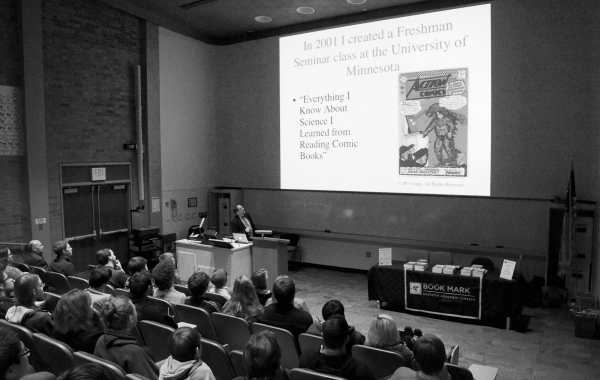For many, a complicated Physics equation fails to elicit more than bewilderment or boredom, but Dr. James Kakalios, the Taylor Distinguished Professor in the School of Physics and Astronomy at the University of Minnesota, has transformed this perception through his lecture, “The Uncanny Physics of Superhero Comic Books.”
The Gustavus community had the opportunity to engage in an examination of the role of physics through the lens of popular comics on Wednesday, Oct. 29 during Dr. Kakalios presentation.
Gustavus Physics Professor Chuck Niederriter was instrumental in inviting Dr. Kakalios to campus, and noted that he and several colleagues had experienced the lecture earlier this summer.
“We thought it was great, very entertaining, and that’s why we invited him to come,” Niederriter said.
Kakalios referenced his development of a freshman seminar on the physics of superheroes at the University of Minnesota and the publication of an article exploring the physics of an incident featured in a Spiderman comic as his initial involvement in the subject area.
In addition to sharing his knowledge through public speaking engagements, Kakalios has also served as a science consultant for the films Watchmen and 2012’s The Amazing Spider Man, and has authored several books.
Kakalios noted his intent is not to negate the possibility of super powers, but to grant them a “one-time miracle exemption on the laws of nature” while analyzing the presence and effects of legitimate science.
Kakalios comedically blended physics and familiar comic book heroes in a manner accessible to both the experienced physicist and the general audience member.
He presented his goal of altering the attitudes some hold toward science, and elicited frequent bursts of laughter from the audience as he discussed “Spiderman and Conservation of Momentum, Electro and Magneto and Electricity and Magnetism,” in the context of formulas and Newton’s Laws of Motion.
Senior Physics and History Major Aly Skoglund was among the attendees, and noted that the lecture had been highly recommended by her professors.
“He was funny, he was very interesting. I was actually surprised by how much physics [Kakalios] actually had in it, how many equations, and he went into the Schrodinger Equation, which I didn’t expect him to do. A lot of it was simple physics, but he also went into the more complicated stuff, which I was happy to hear about,” Skoglund said.
History Professor David Obermiller attended the lecture at the encouragement of his daughter.
“I grew up with comic books, I’ve always loved comic books, what would be cooler to go with your daughter and also learn something about physics and comic books at the same time, and I wasn’t disappointed,” Obermiller said.
Obermiller also reflected on what struck him most about the lecture.
“That you can take a STEM field and present it in a way that’s engaging and gets people who have phobias about the STEM field and actually get them excited about, ‘hey, I could do this.’ In some ways, he could even have challenged a lot of instructors to think in a more creative way of how we could actually reach a broader audience and keep STEM exciting and fun, because I think there is a phobia in American society towards Math and Science fields, and I think we have to find some way to break down that barrier, and I think it’s not to teach it harder or smarter, but to teach it in a more creative way,” Obermiller said.
At the conclusion of the lecture, Kakalios accepted questions. Audience members posed inquiries about the Incredible Hulk’s pants, Asgardian Realms, Thor’s hammer, and whether it’s plausible that Tony Stark hasn’t sustained injury from the forces created by his Iron Man suit, to which Kakalios responded with theories of unstable molecules, wormholes, and simple physical laws of momentum.
Those interested in learning more about Kakalios or his work can visit his website at physicsofsuperheroes.com.
-Libby Larson
